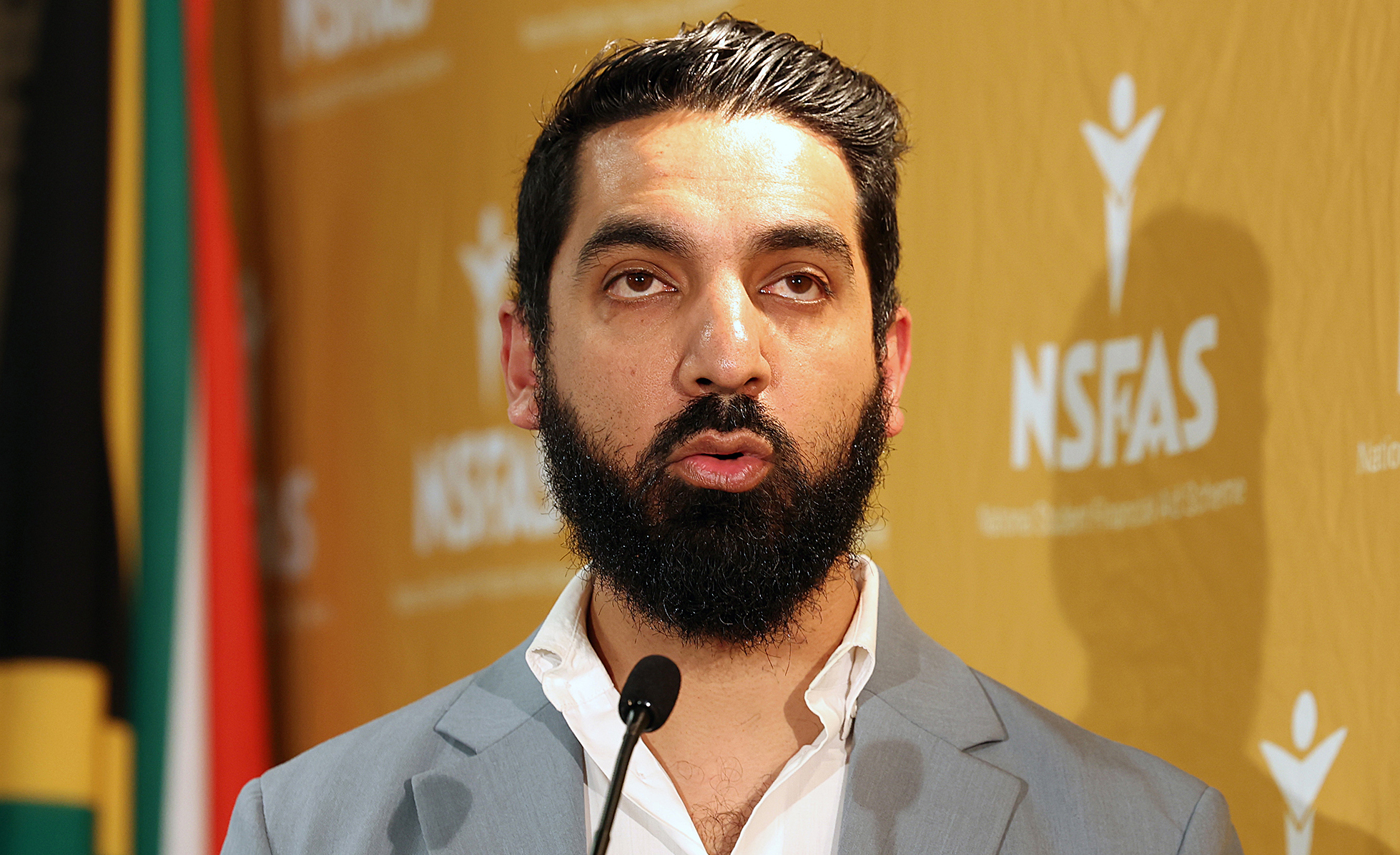The funding crisis at the National Student Financial Aid Scheme (NSFAS) for the 2025 academic year has resulted in some students being unable to register for the second semester and has left students whose registration data was received after the 31 March cut-off date in financial limbo.
According to the NSFAS CEO, Waseem Carrim, and the chairperson of the board, Karen Stander, who briefed the media in Pretoria on Wednesday, 27 August, the scheme is facing major issues.
“NSFAS faces quite a significant budget shortfall for the 2025 academic year. We have a R39-billion allocation for the university sector, and we have disbursed almost 73% of that, which is approximately R29-billion, but we do face a budget shortfall of about R10.6-billion,” said Carrim.
Stander said that this was due to an increase in the number of students qualifying for higher education, the ongoing cost-of-living crisis, which had expanded household eligibility for NSFAS support, and declining state resources in real terms.
In the TVET sector, colleges have a budget allocation of R9.12-billion, and the NSFAS has disbursed more than 70.6% of the allocated funding. However, the NSFAS has a funding shortfall of R1.6-billion in this sector.
“We must face the truth: the root cause lies in a funding model that promised more than the resources available without adjusting eligibility criteria accordingly,” said Stander.
The national convenor of Mayibuye iAfrika Youth League, Keamogetswe Masike, said the NSFAS budget shortfalls would have a severe impact on students in 2026.
“We’re going to kill a lot of dreams and aspirations because some of these kids are also doing serious career courses, which require that they are fully active in class and meaningfully involved in their academic activities. Unfortunately, we were there listening to this boring speech of these guys, but there was no sense of direction,” said Masike.
Read more: Shrinking budget leaves thousands of students with no pathway to higher education
Carrim said the NSFAS was owed R45-billion by students who took loans before 2018, and those students needed to pay back what they owed.
“Many of the students who benefited and who signed loan agreements at the time are employed. Our view is that students who did take up a loan, who graduated as a result of the fund and who are today employed must pay back their debt — not only their debt but also their debt to society because those funds are there to be reutilised to fund new up-and-coming students,” said Carrim.
NSFAS decentralisation
Since 2022, the NSFAS has been paying more than R2.5-million a month on rent for five floors in The Halyard building on Cape Town’s Foreshore, with many MPs and ministers calling for decentralisation. Stander has revealed that NSFAS plans to relocate to Pretoria; meanwhile, Carrim said the Cape Town contract issue was with the Special Investigating Unit, and the Special Tribunal would terminate the contract.
“We are collaborating with the Special Investigating Unit (SIU) processes of approaching the tribunal. This is a complex legal process, and we are committed to ensuring compliance with all relevant laws and regulations. Furthermore, NSFAS will join as a co-applicant in the SIU application to set aside the NSFAS head office lease contract. The application will be made to the Special Tribunal.
“The delays in that process have resulted from the fact of securing a date in the Special Tribunal, but we have been in support of this process and made the requisite plans if the termination is granted,” said Carrim.
Read more: NSFAS’ R2.5m-a-month luxury offices hit by ceiling collapse, flooding
Backlogs of appeals
More than 5,000 student appeals remain unresolved by the NSFAS. The scheme said it had received 87,121 appeals from first-time entrants, returning applicants and continuing applicants.
“Due to the funding deficit, some of the students have not been able to register, even though they have approved appeals. We have rejected 14,700 appeals, and we have close to 6,000 that are unresolved, and many of these, which are currently being processed by our team, relate to the second semester,” said Carrim.
“We do pick up instances where students do not submit all documents required for the appeals process. Once those appeals reach 30 days without resolution, they, unfortunately, have to be closed, and we encourage all students to check the status of their appeals and to submit missing documents if necessary.”
He said the scheme aimed to resolve these appeals in 45 days.
Accommodation crisis
The accommodation crisis has been a major issue, with landlords demanding the NSFAS pay outstanding fees from 2024 and 2025. Meanwhile, the Private Student Housing Association threatened legal action, saying the NSFAS had failed to pay R62-million in student accommodation fees dating back to 2024.
Read more: Landlords threaten legal action as NSFAS fails to pay R62m in student accommodation fees
Carrim said the NSFAS was reviewing student accommodation management and third-party partnerships, including procurement processes to appoint third-party solution partners and accreditation partners; contracting arrangements; potential breaches of contract; as well as potential fraud, corruption and maladministration.
Landlords must pay a 5% commission fee to service providers for every NSFAS transaction. This has been sharply criticised by MPs.
Read more: MPs demand accountability as NSFAS struggles with payments, backlogs and ICT failures
In the 2025 academic year, NSFAS covered the cost of 329,038 beds at 23 TVET colleges and 17 universities.
“NSFAS continues to make substantial payments to landlords who submit legitimate claims. We therefore continue to urge accommodation providers to submit claims according to guidelines to avoid student eviction,” said Carrim.
He said corruption had been seen across the different sectors of the NSFAS, and the board was committed to working with the Auditor-General, Public Protector and SIU to combat this. DM




 The National Student Financial Aid Scheme (NSFAS) CEO, Waseem Carrim. (Photo: Kopano Tlape / GCIS)
The National Student Financial Aid Scheme (NSFAS) CEO, Waseem Carrim. (Photo: Kopano Tlape / GCIS)